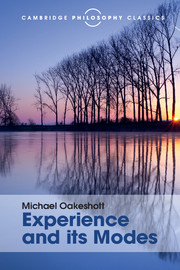3 - Historical experience
Published online by Cambridge University Press: 05 November 2015
Summary
Introduction: history a world of ideas
I intend here to consider the character of historical experience from the standpoint of the totality of experience, that is, to consider the truth or validity of history as a form of experience. And this purpose, as I have already indicated, does not include the attempt to determine the exact degree of truth which belongs to history (as compared with other forms of experience); it does not include the attempt to place history in a hierarchy—either genetic or logical—of forms of experience. On the one side, it may be the case that, in the development of a civilization, an interest in history has been more primitive than (for example) an interest in science. But that belongs to the history of history, which is not what I wish to discuss. It is no part of my plan to indicate the place occupied by history in ‘the development of human experience’. Nor, on the other side, am I able to discover the means by which the exact logical status of history as a form of experience might be determined. And consequently that also must lie outside my plan. My intention, precisely, is to consider the character of history in order to determine whether it be experience itself in its concrete totality or an arrest in experience, an abstract mode of experience; and further, to determine the general character of the relationship between history as a world of experience and other worlds of experience.
Now, it will be seen at once that what I am offering is a view of history from the outside. It is a view of history, not from the standpoint of the historian, but as it appears to one whose interest lies to one side of that of the historian. For, while my plan is to consider the truth of history, the validity of history as a world of experience, the historian is engaged in the attempt to establish truth or coherence in the world of history itself. And it will be said that, whatever else there is in favour of such a discussion, it cannot be contended that it will give us an adequate view of history.
- Type
- Chapter
- Information
- Experience and its Modes , pp. 66 - 129Publisher: Cambridge University PressPrint publication year: 2015

